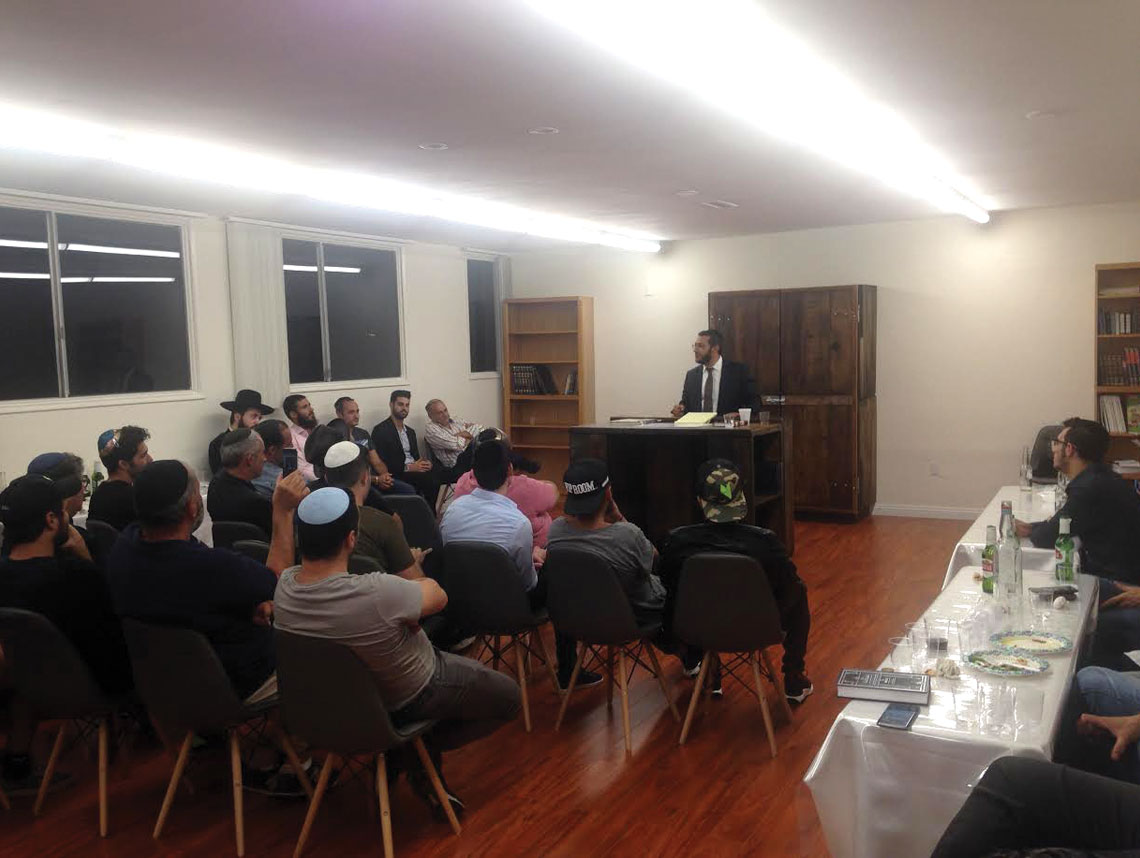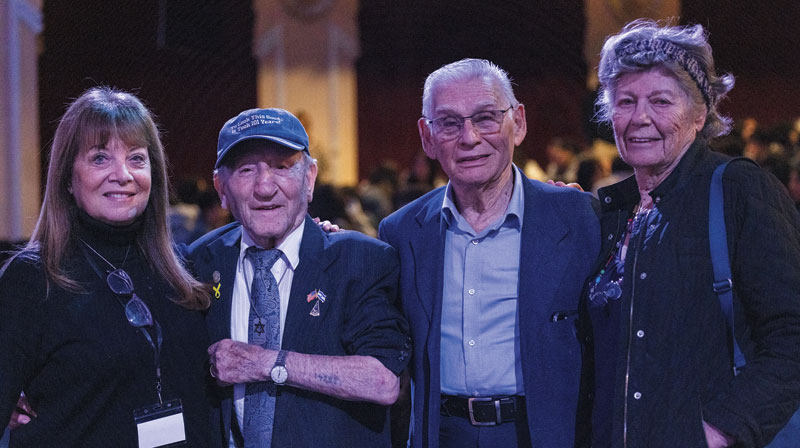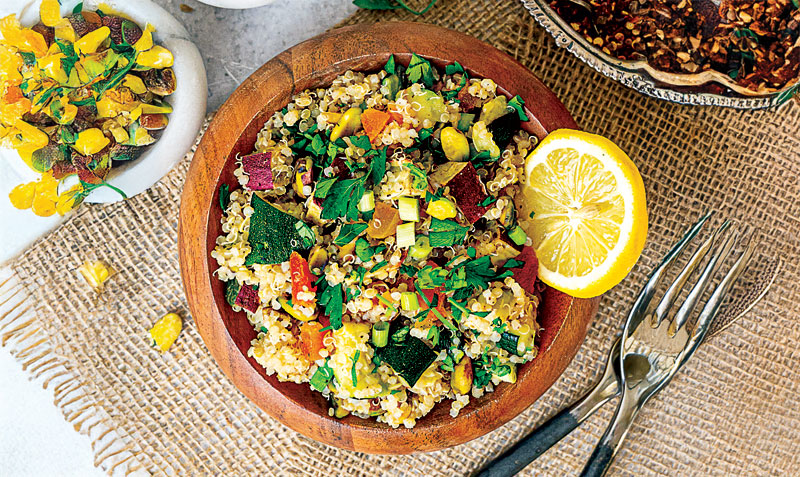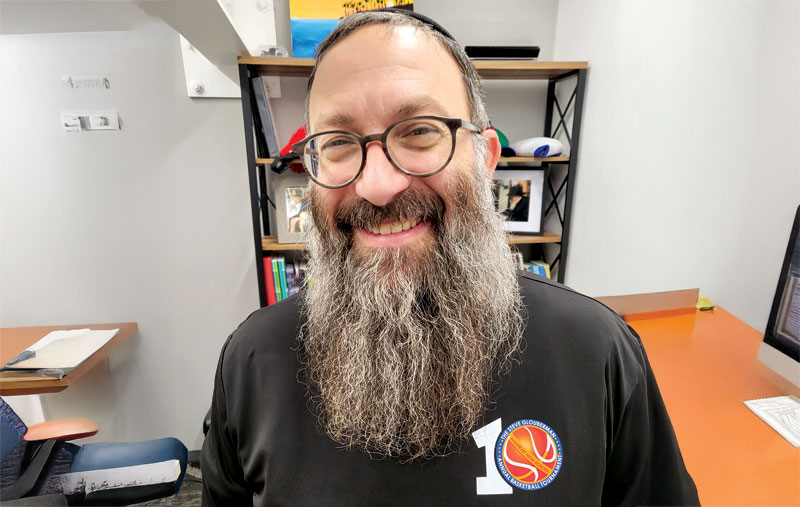
Someone walking into the grand opening of the Jewish French Community Center in Pico-Robertson on Sept. 7 could have easily mistaken the celebration for a Kiddush at a long-established synagogue.
A shirt-and-slacks crowd made a l’chaim over Tunisian fig brandy. Small children scurried around the partition separating men and women, surveying the territory. A gaggle of trend-conscious 20-somethings — were they flirting or just speaking French? — hovered near the food table. The rabbi imparted lessons from the Book. And a beaming volunteer circled with an email sign-up sheet. Bien-venue chez vous, it read — Welcome to your home.
Rabbi Tal Perez, who founded the center, said he wants to foster a unified Jewish community for a booming population of French transplants on the Westside. To that effect, he is launching a congregation, a Jewish learning institute and a Hebrew school, all at the same 1100 S. Beverly Drive address.
The crowd of about 50 at the grand opening — most of them men wearing head coverings — was a cross-section of the community Perez wants to develop: involved in Jewish life, if not necessarily observant; skewing young; and as a group, growing rapidly. For the people there, the space showed promise as a home away from homeland.
“It’s been missed,” said Ben Guez, 28, who moved to Los Angeles from Paris six years ago. “For young people, it’s not like in France, where we like to go to shul for Shabbat [because] we know we’re going to see our friends. Here, young people don’t go to shul. And I hope a center like this will bring people back.”
Guez is part of a wave of Jews who have migrated from France after several high-profile anti-Semitic attacks there in the past decade. Thousands of Parisians moving to Israel in the past few years have driven the growth of cities such as Ashdod and Netanya. The ones who come to the United States end up in Miami or Los Angeles.
Perez, a Paris native, said it seems like every week he hears about a new French-Jewish family that has arrived in Los Angeles. No exact numbers on those immigrants are available, partly because there is no organization to accept and integrate them.
The Jewish French Community Center does not figure to formally assume that role. Perez, who is a certified mohel, sofer (scribe) and dayan beit din (judge of Jewish court), envisions the center serving all of the functions of a community shul, rather than a federation.
As French Jews have poured into Los Angeles, they have stuck together, clustering at the Pinto Center on Pico Boulevard and Baba Sale Congregation on Fairfax Avenue. Perez said that while the center will have Shabbat services, he wants it to complement those shuls rather than compete with them.
“French people have a special mentality,” Perez said. “They are always together. They integrate [with the local community], but they need family — to be surrounded with French people.”
Perez came to Irvine in 2012 from Israel, where he had studied under Ovadia Yosef, the late Sephardic chief rabbi of Israel. After a stint leading a Sephardic minyan in Irvine, Perez looked for a congregation to lead in Los Angeles.
In the meantime, he developed a loyal audience, teaching all over Southern California. His following helped get the community center project off the ground.
“He’s one of the smartest people walking the streets of L.A.,” said Josh Golcheh, 27, a real estate developer who also does Jewish outreach in Los Angeles. “He has the highest credentials, but he’s so modest and he’s so humble, he doesn’t boast about it.”
The 15-minute exegesis of the week’s Torah portion that Perez delivered in French during the ceremony was typical of his energetic style, according to people who could understand what the rabbi was saying.
Although some people in the crowd were not Sabbath observant in the way American Jews might typically define it, French Jews generally follow the Orthodox tradition. A nonobservant French Jew might not go to services every week, and when he does, he might drive to get there. But he won’t be looking for a place with mixed seating in the gallery.
Perez said kiruv — bringing people closer to the faith — is one of the Center’s missions — “But in a different way,” he added. “To awaken in people the curiosity, through learning, to know more and more who we are.” Thus, education is the main focus of the center, with the rabbi leading classes every weekday for adults. “The worship is secondary,” he said.
Still, the center’s millennial cohort saw the programming as a beacon of social opportunity.
“It’s a way to meet people we don’t know, from a community we don’t get to see often,” said Aurelie Banoun, 24, who immigrated from France three years ago.
Just a stone’s throw away from Pico Boulevard, where a shul construction boom has turned a 10-block stretch into Synagogue Strip, the center’s second-floor study hall is a humble space in what used to be a real estate broker’s office. It’s about as big as a dive bar, and no more baroque.
The building has no formally dedicated banquet halls or sponsored staircases, which Perez said is in line with the inclusive ethos he wants to build in the community — although he acknowledged that a few major donors bankrolled the project.
Although the center targets a French-speaking population — most from France and others from French-speaking countries such as Tunisia and Morocco — the rabbi insisted that it is open to everyone. There is no membership fee, according to a center volunteer, and the center won’t be auctioning off aliyot (although congregants can use the honors as an opportunity to donate). The Hebrew school, called Talmud Torah, which has 15 students enrolled from ages 7 to 13, is priced to be affordable.
But Perez will deliver his sermons in French.
Dean Hattab, who moved to Los Angeles from Paris earlier this month to pursue a career in the music industry, is still searching for a place to live. But he was pleased to discover the social scene at the center.
“Everything in the Jewish community is all about family,” Hattab said. “It’s about helping each other, and finding this here, it’s reassuring.”






















 More news and opinions than at a Shabbat dinner, right in your inbox.
More news and opinions than at a Shabbat dinner, right in your inbox.